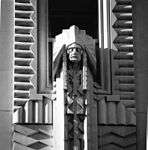SmithGroupJJR
SmithGroupJJR is an architectural firm headquartered in Guardian Building in Detroit, Michigan. As of 2016, it ranks among the top 10 Architecture firms according tohttp://www.architectmagazine.com/architect-50/2016/ and as the United States' seventh largest architecture and engineering firm (Building Design & Construction, July 2015). The firm is composed of client industry-focused practices serving Campus, Community, Waterfront, Health, Learning, Science & Technology, and Workplace markets. The firm has offices in ten cities: Detroit, Ann Arbor, Chicago, Dallas, Los Angeles, Madison, Phoenix, San Francisco, Shanghai, and Washington, D.C. The firm employs 800.
Established in Detroit in 1853 by architect Sheldon Smith, SmithGroupJJR, along with Luckett and Farley, is the longest continually operating architecture and engineering firm in the United States that is not a wholly owned subsidiary.[1]
In 2000, the firm changed its name from Smith, Hinchman & Grylls to SmithGroup. In 2011, the firm incorporated its sister firm, JJR, into its current name.
The firm expanded outside North America by opening an office in Shanghai, China, in December 2013. [2]
Notable architects from SmithGroupJJR include Minoru Yamasaki and Wirt C. Rowland.
Works

- Central United Methodist Church (1866)
- Detroit Opera House (1868)
- Ford Piquette Avenue Plant (1904)
- Dodge Main Factory (1910)
- Central Power Plant, University of Michigan (1914)
- Fyfe Building (1916–1919) — Amedeo Leone
- Hilberry Theatre (1917), originally the First Church of Christ Scientist — Field, Hinchman and Smith
- Yost Ice Arena (formerly, Yost Field House) (1923), University of Michigan, Ann Arbor — T. J. Hinchman[3]
- J. L. Hudson Department Store and Addition (1923–1946)
- Bankers Trust Building (1925) — Wirt C. Rowland
- The Players Clubhouse (1925) — William E. Kapp
- Buhl Building (1925) — Wirt C. Rowland
- Mistersky Power Plant (1925) — Amedeo Leone[4]
- Jefferson Avenue Presbyterian Church (1926), Indian Village, Detroit — Wirt C. Rowland
- Meadow Brook Hall (1926) — William E. Kapp, Rochester, Michigan
- Parke-Davis Administration Building (1926) — Amedeo Leone[4]
- Michigan Bell (now AT&T) Detroit-Columbia Central Office Building (1927)
- Kelvinator Administration Building (1927), 14250 Plymouth Road, Detroit, Michigan, also known as Plymouth Road Office Complex (PROC) — Amedeo Leone[4]
- League of Catholic Women Building (1927)
- Country Club of Detroit (1927), Grosse Pointe Farms, Michigan — Amedeo Leone[4]
- School and convent buildings at Saint Paul Catholic Church (1927), Grosse Pointe Farms, Michigan
- Music Hall Center for the Performing Arts (1928) — William E. Kapp
- Intramural Sports Building (1928), University of Michigan, Ann Arbor — Theodore J. Hinchman[3]
- Penobscot Building (1928) — Wirt C. Rowland
- Guardian Building (1929) — Wirt C. Rowland
- Denby High School (1930) — Wirt C. Rowland[3]
- Pershing High School (1930) — Wirt C. Rowland[3]
- Detroit Public Library (1932)
- Rackham School of Graduate Studies at the University of Michigan (1938), Ann Arbor, Michigan
- Pease Auditorium, Eastern Michigan University, Ypsilanti, Michigan (1941)
- GM Tech Center [Architect of Record] (1955), Warren, Michigan
- 1001 Woodward (the former First Federal Building, 1965), Detroit, Michigan
- National Institutes of Health Research Laboratories (1968), Bethesda, Maryland
- Kmart Corporation International Headquarters (1969), Troy, Michigan
- Harper Hospital in the Detroit Medical Center (1970)
- Hart Plaza, including the Dodge Fountain designed by Isamu Noguchi (1978)
- Joe Louis Arena, home of the NHL Detroit Red Wings (1979)
- IBM Corporation Manufacturing and Engineering Complex (1979), Tucson, Arizona
- Defense Intelligence Agency Headquarters (1984), Washington, DC
- Eli Lilly and Company Biomedical Research Center (1984), Indianapolis, Indiana
- Chrysler World Headquarters (1996), Auburn Hills, Michigan
- Comerica Park, home of the MLB Detroit Tigers (2000)
- Phelps Dodge Corporate Headquarters (2001), Phoenix, Arizona
- Chesapeake Bay Foundation Headquarters, the first building in the United States to earn a LEED Platinum certification (2001), Annapolis, Maryland
- Edward H. McNamara Terminal Detroit Metropolitan Airport (2002), Romulus, Michigan
- University of California, San Francisco Mission Bay Genentech Hall (2002), San Francisco, California
- Ford Field (2002), home of the NFL Detroit Lions
- Consumers Energy, Corporate Headquarters (2003), Jackson, Michigan
- Discovery Communications World Headquarters (2003), Silver Spring, Maryland
- Federal Reserve Bank of Chicago Detroit Branch (2004), Detroit, Michigan
- Visteon Village, Corporate Headquarters (2005), Van Buren Township, Michigan
- Lawrence Berkeley National Laboratory Molecular Foundry (2006), Berkeley, California
- National Academies Building, Washington DC
- Brock Environmental Center(2014), Virginia Beach, VA
- University of Illinois, Electrical and Computer Engineering Building (2014), Urbana, Illinois
- Museum of the Bible (2017)
References
- ↑ Cramer, James P. (2005). Almanac of Architecture and Design. Atlanta, GA: Greenway Communications. p. 348. ISBN 0-9675477-9-2.
- ↑ Criswell, Jakita (9 December 2013). "Architectural Firm SmithGroupJJR Launches Office in Shanghai, China". DBusiness Magazine. Retrieved 26 January 2014.
- 1 2 3 4 Original Smith, Hinchman & Grylls building plan sheets
- 1 2 3 4 American Institute of Architects application
Further reading
- Hill, Eric J. and John Gallagher (2002). AIA Detroit: The American Institute of Architects Guide to Detroit Architecture. Wayne State University Press. ISBN 0-8143-3120-3.
- Meyer, Katherine Mattingly and Martin C.P. McElroy with Introduction by W. Hawkins Ferry, Hon A.I.A. (1980). Detroit Architecture: A.I.A. Guide Revised Edition. Wayne State University Press. ISBN 0-8143-1651-4.
- Thomas J Holleman & James P Gallagher (1978). Smith, Hinchman & Grylls: 125 Years of Architecture and Engineering, 1853-1978. Wayne State University Press. ISBN 0-8143-1615-8.
External links
- SmithGroupJJR company website
- Architectureweek.com: Article about the company on its 150th anniversary — in Architecture Week.
